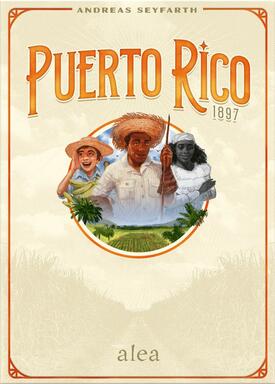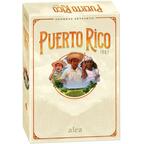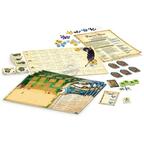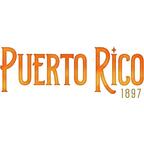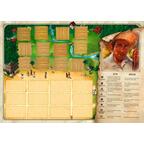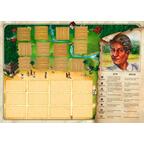Puerto Rico 1897 takes place the year after Puerto Rico gains political autonomy and separates from the Spanish colonial government. In the game, you play as an independent Puerto Rican farmer in this new era and compete with others to hire workers to grow, sell and trade valuable crops. You will also be tasked with resurrecting parts of the country by attempting to build vital urban infrastructure. Your goal throughout the game is to gain more wealth and prestige than your opponents and become the most successful farmer in the country. Each player has their own small board with spaces for city buildings, plantations and resources. Players share three ships, a trading house and a supply of resources and doubloons.
The resource cycle of the game is as follows: players grow crops which they exchange for points or doubloons. The doubloons can then be used to buy buildings, which allow players to produce more crops or give them other abilities. Buildings and plantations only work if they are occupied by workers. During each round, players take turns choosing a card from the cards on the table (e.g. "Trader" or "Builder"). When a role is chosen, each player can perform the action associated with that role. The player who chose the role also receives a small privilege; for example, choosing the role 'Builder' allows all players to build a building, but the player who chose the role can do so at a reduced price during that turn. Unused roles gain a doubling bonus at the end of each round, and the next player to choose that role can keep any doubling bonus associated with it. This encourages players to use all roles in a typical game.
Puerto Rico 1897 uses a variable phase order mechanism in which a token is passed to the next player clockwise at the end of a turn. The player with the token begins the turn by choosing a role and taking the first action. Players earn victory points by owning buildings, shipping goods and occupying 'large buildings'. The shipping tokens accumulated by each player are kept face down and come in denominations of one or five. This prevents other players from being able to determine the exact score of another player. Goods and doubloons are placed in plain view of the other players, and each player's totals can always be requested by a player. As the game enters its final stages, the unknown quantity of shipping tokens and their denominations force players to consider their options before choosing a role that may end the game.
Contents of the box : 6 game boards, 50 merchandise pieces, 54 coins, 100 workers, 20 nobles, 58 island tiles, 50 victory point tokens, 10 role cards, 7 ships, 90 building tiles, 1 game rule.
